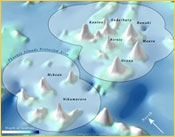Welcome
In 2006, the Government of Kiribati declared the Phoenix Islands archipelago and waters surrounding them as the third largest marine protected area in the world, officially named the Phoenix Islands Protected Area (PIPA). This remarkable protected area will be financed through a unique “reverse fishing license” endowment which will repay the government of Kiribati for the revenue lost due to the prohibition of commercial fishing in the PIPA.
The Phoenix Islands, isolated islands with coral reefs teeming with life and tropical skies alive with seabirds, is one of the most pristine places left on our planet. A string of eight atolls and two submerged reefs located halfway between Hawaii and Fiji, it is a sanctuary for many marine animals and seabirds.
The isolation of these islands from human activity has allowed natural preservation and has lessened negative impacts on coral reefs, fish, seabirds and other life. The animals indigenous to these islands have undergone stress in parts of the world more closely connected to human activity, making the PIPA a gem to conservationists and scientists worldwide.
Kiribati President receives International Conservation Leadership Award
“With the threat of global climate change, remoteness can no longer be relied upon to conserve our atolls, reefs and marine life,”…“I hope other countries - in particular developed countries - will follow the example set by the Republic of Kiribati and take action to protect the world’s natural resources.”
~ The Honourable Anote Tong
President, Republic of Kiribati
Comments at Acceptance of Outstanding Conservation Leadership Award
